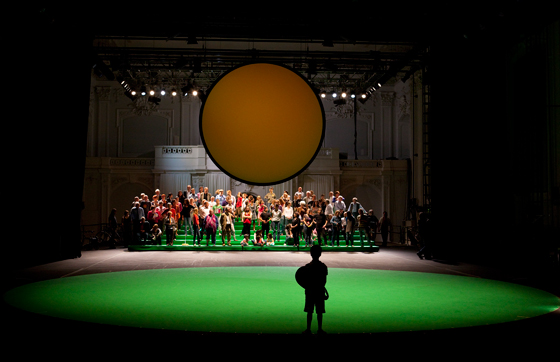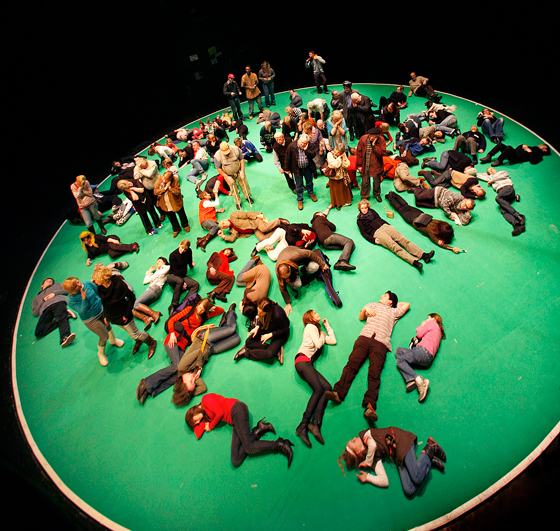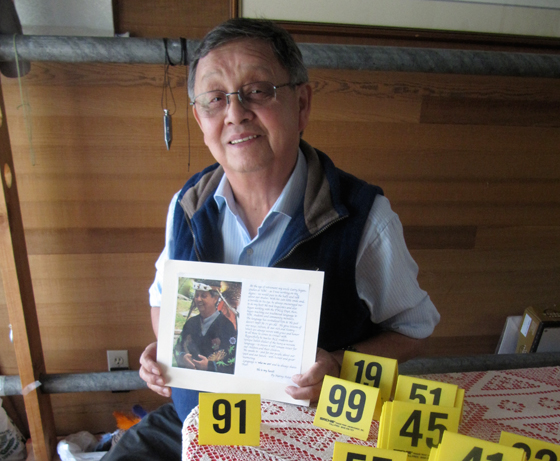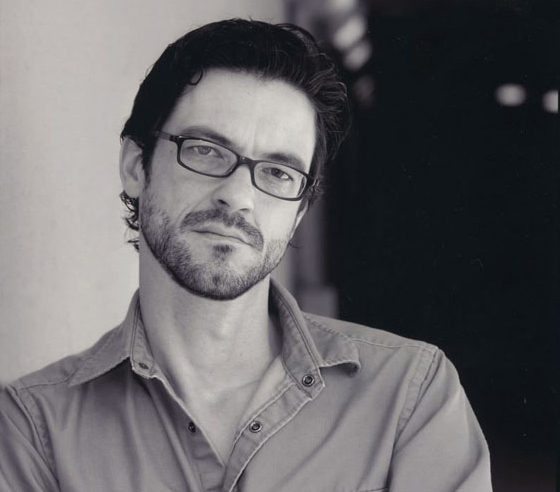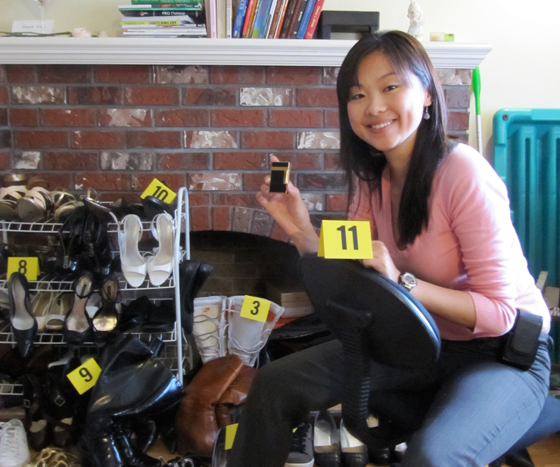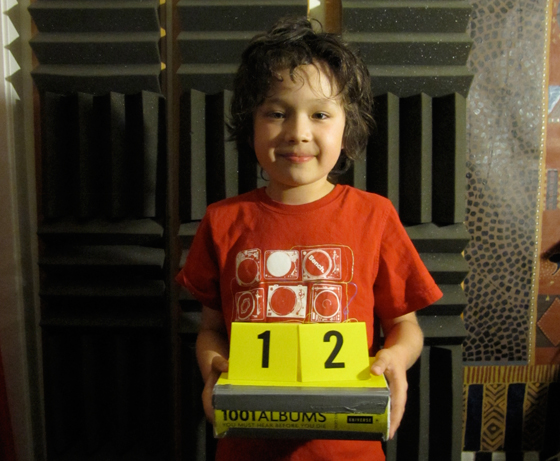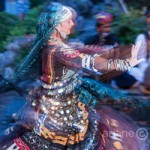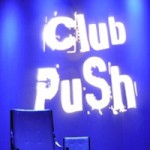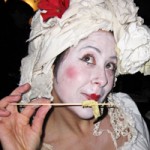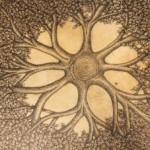100% Vancouver is based on an ongoing project of Berlin’s Rimini Protokoll, which has included past stage productions 100% Berlin and 100% Vienna. With work like the interactive Best Before (2010 PuSh Festival), the company’s signature style draws on the perspectives of “experts in daily life” to create contemporary works where everyday people are the theatre’s real protagonists.
One by one, 100 people enter the stage. These are not trained actors. These are everyday Vancouverites. The demographics of a city brought to life, with the stories and individuals that make up Vancouver 125 years after its official beginning. As questions are posed, the participants sort themselves according to opinions and political leanings, where they’re from, how they spend their time, car they drive, bus they take, peanut butter preference and so on. A living, breathing portrait of Vancouver emerges.
Each person represents 1% of the roughly 646,385 people residing in Vancouver. Casting starts with a single person. This first person has 24 hours to recruit the next person, who must then find the next, and so on. In just over three months, the full 100 are linked. Participants are chosen according to specific search criteria—gender, age, marital status, ethnicity, and neighbourhood in which they live—attempting to reflect the demographics of the last census.
This particular 2011 PuSh Festival production perked my curiousity, so I contacted the production’s casting director and dramaturge, Tim Carlson.
Q: How did you call out for Vancouverites to participate?
The process, set out by Rimini Protokoll in Berlin and Vienna, is a “statistical chain reaction.” For the Vancouver show, we established criteria based on Vancouver stats from the 2006 census. We picked Patti Wotherspoon, a researcher at VPL who works with stats every day, to be our first participant. She chose the next person and so on.
The idea is that the cast would be connected at a human level. Each person represents a statistical value but they humanize that value on stage. They are not a random sample of disconnected individuals. Maybe this process mimics social media to a degree but being interviewed by the casting team in their homes, photographed with a cherished item and then joining their 99 “friends” on stage is several degrees more adventurous and revealing than trading messages.
Q: What were some of the challenges that you faced getting this production ready?
One challenge — which almost made a pro sport of casting — was that our four-person casting team was to contract, interview and photograph 100 people in 100 days.
In Berlin (pop. 3.4 million) and Vienna (1.9 m), the casting team had a substantially deeper well of potentials to draw from than in Vancouver (just under 600,000 in 2006).
This might be one reason the chains tended to break after 10 or 6 or 3 people. We had to adjust our chain reaction strategy by advertising on Craigslist, through the school board and community centres but, for the most part, contacts of our own or through PuSh and Theatre Replacement were the people who started new groups of participants. So instead of a single chain rolling out in an unbroken line we ended up with clusters of connections gathered around the production team.
At the beginning, it was easy to find people who filled all five categories — i.e, a single male teen living in Grandview Woodlands who has English as a first language. But when we had cast 80 people, we had filled the criteria for women (51%) and for English speakers (49%). We needed to find married male Punjabi speakers over 40 living in Killarney, for example. And eventually, we did it.
We cast 100% on day 105. If you subtract Labour Day, Thanksgiving, Halloween and Remembrance Day, you could say we did it in 101. We worked weekends.
Q: Did you find too many of one statistical value, or did the variety of participants organically fall into place?
As we closed off categories, we had to prioritize some of our criteria. Would we cast a single English-speaking female in her 30s anyway to ensure we had the Oakridge neighborhood represented? Or instead choose a married male in his 70s with a First Nations language even though we already had our quota from Dunbar-Southlands?
There are 23 neighborhoods in Vancouver. Three neighborhoods are not represented in 100% Vancouver: Oakridge (2%), South Cambie (1%) and Shaughnessey (2%).
However, there are 21 different first languages represented — 22 if you include Chinglish, as one participant said.
Sixteen per cent were born in Vancouver; 13% born elsewhere in BC; 27% born elsewhere in Canada; and 27% born in Asia. Every continent is represented.
We hit our quota for the 0-9 age range (8%), went over in the 20s range (20% rather than the 18% quota) and were under in the 80+ category (2% rather than 3% goal).
Q: Do you plan to archive this for future generations? The project sounds like a history vault item in the making!
Perhaps I can interest you in the 100% Vancouver boxed set.
Produced by the highly regarded art book publisher Fillip, this delightful and illuminating production features 100 cards bearing a portrait of each participant with their stats on the back. The box also includes a book of essays by Berlin’s Rimini Protokoll, New Yorker George Pendle, Vancouver’s Frances Bula, and myself (from lower Mt. Pleasant).
The box also offers a distinct portrait of Vancouver at 125. It’s a wonderful keepsake for participants and friends. A work of art for the serious collector. The perfect gift for all occasions. Limited quantities. Don’t be disappointed. On sale at 100% Vancouver, Jan. 21 & 22.
100% Vancouver will be performed as part of the 2011 PuSh International Performing Arts Festival on January 21st and 22nd at 7 pm, with a 4 pm matinee on the 22nd. It’s being presented in conjunction with both Theatre Replacement and SFU Woodward’s, at the Fei and Milton Wong Experimental Theatre.
Advance tickets are available via ticketstonight.ca, by emailing tickets [at] pushfestival [dot] ca, via phone (604.605.8284) or at the door. In honour of Vancity’s 65th anniversary, audience members with proof of current Vancity membership will receive a $6.50 ticket discount at the door only.
